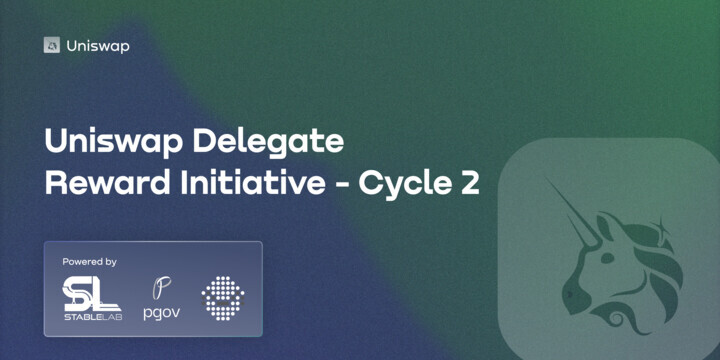 Uniswap Delegate Reward Initiative - Cycle 2
Uniswap Delegate Reward Initiative - Cycle 2
Authors: @Doo_StableLab @PGov @AranaDigital
This proposal outlines the Uniswap Delegate Reward Initiative - Cycle 2, a compensation program designed to improve participation quality and dedication among Uniswap delegates following the conclusion of Cycle 1.
In late February 2024, StableLab proposed the Uniswap Delegate Reward Initiative 14. After the GovSwap event in Denver, further research to plan and implement the Delegate Reward Initiative was highlighted, leading to the formation of the Uniswap Delegate Reward Working Group, composed of 8 members from different organizations. After extensive research for more than a month, the Working Group produced several findings, which can be found here: https://gov.uniswap.org/t/findings-from-uniswap-delegate-reward-working-group/23702 7
Incorporating these findings, the Uniswap Delegate Reward Initiative–Cycle 1 was proposed 4 and launched 2 in June 2024.
The 12 delegates that were selected under Cycle 1 maintained 100% voting participation rate for both offchain and onchain votes during this period. In addition, the Delegate Reward Initiative discussion attracted several new delegates.
New Delegate NameDelegate Join DateSEEDGovMay 2024CuriaJune 2024TanéJune 2024BobbayJuly 2024WhetstoneJuly 2024
While Cycle 1 was simple and effective, there were several suggestions to have a tier system to incorporate different participation levels of delegates. In addition, various suggestions were shared on how to make a points system to determine the top delegate applicants more fair and objective.
Application Eligibility
Delegate Reward Eligibility
Once delegates have passed the application process, they must fulfill the following requirements to be eligible for up to $6,000 USD worth of $UNI reward per month.
Requirements
1.Maintain 80% onchain and offchain voting participation for the past 3 months. Achieving this will provide $3,000 USD worth of $UNI
Additional Rewards (the below are only available if the above Requirement of Voting Participation is fulfilled)
2a. Write rationale for the voting on their delegate profile.
2b. Attend Uniswap Community Calls.
Achieving these above will provide an additional up $3,000 USD worth of $UNI.For 2a and 2b, it allows proportional payment. For example, if there were 4 votings and 1 community call, and a delegate missed to write a rationale of 2 of the votings. The delegate would be eligible to receive $1800 [3/5 * $3000].
In case there are more than 15 eligible applicants, the top 15 will be chosen by the following objective metrics. The highest number of available point would be 10.
1. Voting Participation
-Considering one of the primary roles of the delegate is to receive voting power from their delegators to vote on behalf for the best of Uniswap, voting participation is crucial to ensure quorums are met and malicious proposals are prevented. The total point amount from this category is 6. The onchain part is weighted more heavily due to its usual frictions such as gas cost, as well as its ability to dictate governance contract alterations and movement of treasury funds. The voting rate is based on the past 6 months.
1. Offchain Voting (Snapshot)
2. Onchain Voting
3. The date of the first on chain vote is 3 months or more (this is to counterbalance very new applicants who have few votes and able to get full points on the voting)
2. Proposal Authorship
-Helping to write proposals for Uniswap DAO is important. However, we also want to prevent low-quality or malicious proposals. Therefore, only passed votes would count. The total points for this category is 3. The onchain part is weighted more heavily once again.
In case of non-binary proposals, if the choice equivalent to “No” was present, and the end voting result was another choice than “No”, then it would be considered as valid for below. For example, Uniswap Treasury Working Group (UTWG) Election wouldn’t be valid for the points as there’s no “No” vote . But [Temp] Uni Onboarding Package - BSC would be valid for the points as there was a choice of “Against”. And the voting result was “$1m”.
1. Authored or Co authored a proposal that passed offchain (snapshot) vote before.
2.Authored or Co authored a proposal that passed onchain vote before
3. Other Governance Participation
-The full point for this category is 1. This category is to recognize other ways one could contribute to discussion regarding Uniswap Governance. This can be achieved by either
1. Joined Uniswap Gov Workshop Before
Or
2. Joined Uniswap Community Call Before
Tie Breaker
-Ties will be decided by the date of the first on chain vote these applicants casted in order to reward those delegates that have been contributing to Uniswap governance for an extended period.
Budget
We are requesting 540,000 [6000 USD *6 Months *15 Delegates ] USD worth of UNI for the Uniswap Delegate Reward Initiative, which would be 84,000 UNI
The total amount, once approved, will be sent to the Accountability Committee, which will be responsible for the monthly distribution of rewards to eligible delegates and the proposal authors. Since the total budget of the now disbanded Delegate Reward WG has not been fully used, administration of this reward program–including the creation of this proposal and the admin work behind verifying monthly delegate participation–will be paid for using the current balance of $41.6k. The monthly admin consumption will be communicated each month to the DAO.
EXECUTED